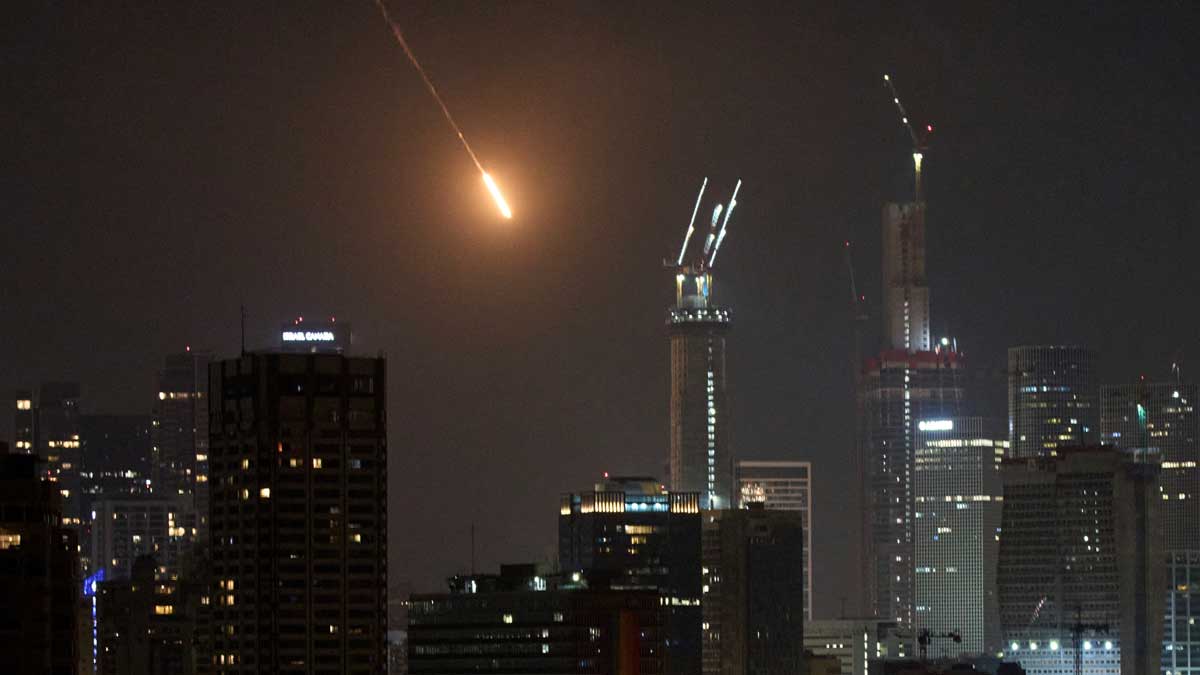Iran launches missile barrage on Tel Aviv and Jerusalem in retaliation for Israeli strikes
 The trace of a projectile is seen before hitting Tel Aviv | AP
The trace of a projectile is seen before hitting Tel Aviv | AP
Iran launched a massive missile assault on Tel Aviv on Friday night and early Saturday morning in retaliation for a surprise Israeli aerial offensive earlier on Friday targeting its nuclear and military infrastructure. The Islamic Revolutionary Guard Corps claimed responsibility for the counterstrike, codenamed “True Promise 3,” saying it had hit “dozens of targets, military centres and airbases” across Israel.
The Israeli military reported that up to 100 missiles were fired in waves, with most intercepted or missing their intended targets. However, several Iranian projectiles penetrated Israel’s air defence systems, striking key sites in and around Tel Aviv. Sirens blared across the city around 9pm, followed by the distinctive booms of Arrow missile defence interceptors and the crashing sounds of warhead impacts.
Social media footage, verified by news agencies, captured a missile strike near the Israeli Defence Forces headquarters in the Kirya district. The Marganit Tower, a prominent Tel Aviv landmark, was visible in the footage moments before a flash of light and a loud explosion marked the impact of an incoming missile.
The strikes came in response to Israel’s earlier assault on Iranian soil. On Friday morning, Israeli warplanes and drones bombed nuclear facilities and military command centres across Iran in a campaign referred to as “Rising Lion.” The attacks killed several senior military officials, including the commander of the Revolutionary Guards and the chief and vice chief of the Iranian army along with key nuclear scientists.
The attacks also reportedly destroyed Iran’s aboveground uranium enrichment plant near Natanz. The head of the UN nuclear watchdog, Rafael Grossi, said the blast caused chemical and radiological contamination but deemed the leak “manageable.”
Following the initial Israeli assault, Iran’s Supreme Leader Ayatollah Ali Khamenei appeared on state television and vowed a harsh response. “The armed forces of the Islamic republic will inflict heavy blows upon this malevolent enemy,” he said. His newly appointed Revolutionary Guards chief, Mohammad Pakpour, threatened to open “the gates of hell” on Israel.
By Friday night, missiles were flying in both directions as Iran struck targets in Israel and Israeli forces responded in kind. Ballistic missiles from Iran reportedly hit at least seven locations around Tel Aviv, including military compounds and urban areas. One woman died in Ramat Gan and over 30 people were hospitalised, several with serious injuries. Fire officials confirmed that multiple individuals were rescued from damaged buildings. Israeli media showed scenes of devastation, including wrecked vehicles and blackened residential blocks.
Israel’s Defence Minister, Israel Katz, said Iran had “crossed a red line” by targeting civilian areas. Prime Minister Benjamin Netanyahu declared that the operation to dismantle Iran’s nuclear capabilities was just beginning. “In the past 24 hours, we have taken out top military commanders, senior nuclear scientists, the Islamic regime’s most significant enrichment facility and a large portion of its ballistic missile arsenal,” Netanyahu said in a late-night video address. “More is on the way. The regime does not know what hit them, or what will hit them. It has never been weaker.”
Fighting also intensified over Jerusalem, where explosions were heard and defence interceptors were launched. Israel reported that Iran’s attacks caused some structural damage and wounded about 20 people. Meanwhile, Iran’s ambassador to the United Nations, Amir Saeid Iravani, claimed that 78 people were killed and 329 injured in the Israeli strikes on Iran.
Around the region, tensions ran high as fears grew of a wider conflict. Residents of Tehran reported hearing constant anti-aircraft fire in the capital’s Pastour district. Iran vowed further retaliation, insisting the Israeli offensive constituted an act of war. The situation has sparked alarm internationally, with European leaders expressing concern that Israel’s military escalation could destabilise the region further.
In the eastern Mediterranean, meanwhile, the United States quietly provided support to Israel. A senior American official confirmed that US military assets helped intercept some of the incoming Iranian missiles, a move aimed at protecting both American forces in the region and Israeli territory.
However, official messaging from Washington has been inconsistent. On Friday morning, Secretary of State Marco Rubio distanced the US from Israel’s attack, emphasising that the operation was unilateral. President Donald Trump struck a different tone a while later. Writing on Truth Social, he said Iran had been given “chance after chance” to strike a nuclear deal but had failed. He described the Israeli assault as a “very successful attack” and said future violence could be avoided if Iran agreed to a deal. “There has already been great death and destruction, but there is still time to make this slaughter, with the next already planned attacks being even more brutal, come to an end,” Trump wrote.
Speaking to the CNN on Friday night, Trump further reiterated his strong support for Israel. When asked about Rubio’s earlier remarks, he responded unequivocally: “We of course support Israel, obviously, and supported it like nobody has ever supported it.”
Middle East